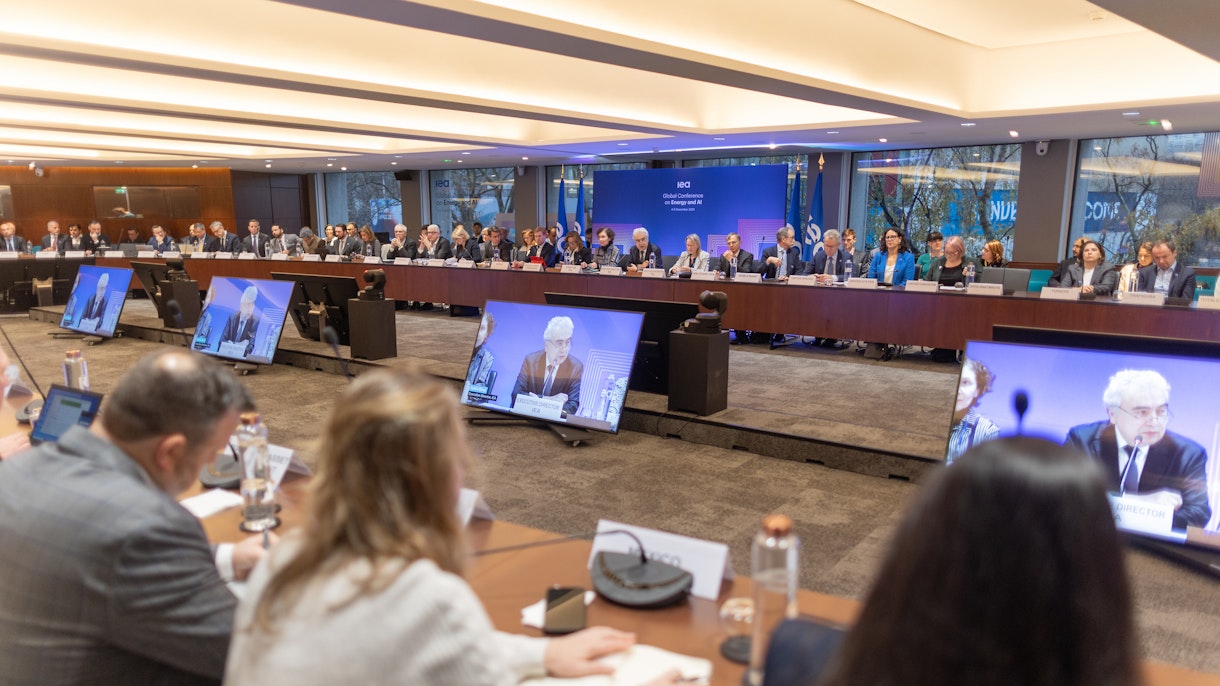Leading figures from governments, the energy sector, the tech industry, and civil society gathered for the first major international meeting of its kind to address the growing relationship between energy and artificial intelligence (AI). The event, the IEA’s Global Conference on Energy & AI, was held on 4-5 December at the International Energy Agency (IEA) headquarters in Paris. The conference brought together approximately 500 participants to explore how AI and energy systems can evolve together to meet future demands securely and sustainably.
Key Highlights
- Strategic Roundtable and Technical Forum: The two-day event featured a high-level roundtable to foster understanding on energy and AI issues and a technical forum for experts to exchange ideas.
- Focus Areas: Discussions centered on how to meet AI’s growing energy demands while ensuring sustainability and security, and how AI could be leveraged to optimize energy systems and accelerate energy innovation.
- Statements from IEA Leaders: IEA Executive Director Fatih Birol emphasized the symbiotic relationship between energy and AI. He stressed that there is no AI without energy, particularly electricity. He called for greater collaboration between policymakers and the industry to address the rapidly growing energy demands linked to AI adoption. Birol also noted AI’s potential to transform the energy sector by enhancing innovation, improving efficiency, and accelerating the energy transition.
The Rising Demand for Energy
The expansion of AI technology presents both opportunities and challenges in the energy sector. AI is already helping accelerate the discovery of new energy materials and technologies, as well as improving energy production, consumption, and distribution.
- Data Centers and Energy Consumption: The digital economy, driven by AI, is increasingly reliant on large data centers. These centers can consume as much electricity as 100,000 households. Although they currently account for just 1% of global electricity usage, their growth poses significant challenges to the energy grid in certain areas. For instance, in Ireland, data centers already account for 20% of electricity demand, while in Virginia, USA, they account for over 25%.
Key Participants and Insights
- Global Representation: The conference featured participation from ministers and high-level government officials from around 25 countries, including Brazil, Canada, France, India, Japan, Singapore, the UK, and the US.
- Industry Leaders: CEOs and senior executives from companies with a combined market value of $15 trillion attended the event. Some notable companies represented included Amazon Web Services, Google, Hitachi Energy, Iberdrola, Infosys, Meta, Microsoft, NVIDIA, and Schneider Electric.
- Dr. Fatih Birol’s Remarks: Dr. Birol highlighted the importance of understanding AI in the context of energy. He also emphasized the IEA’s role in addressing both the opportunities and risks associated with the growing relationship between AI and energy.
Future Actions and Collaborative Efforts
- Canada’s Commitment: Canada announced its collaboration with the IEA to develop a strategic approach to AI and energy issues, which will be formalized in 2025 under its G7 Presidency.
- France’s Leadership: France, the host of the upcoming AI Action Summit in February, also committed to working with the IEA to create a robust framework on the AI-energy nexus.
- Korea’s Role: Korea, set to host the 2025 APEC Energy Ministerial and other related events, expressed its intention to advance discussions on energy and AI through collaboration with the IEA.
Upcoming Initiatives
- AI-Based Chatbot: The IEA is set to launch an AI-based chatbot that will assist users in exploring the 2024 World Energy Outlook report. Developed in collaboration with Microsoft, the tool will provide natural, conversational answers about energy trends and insights from the report.
- Student Fair: During the conference, the IEA hosted a student fair to explore AI-driven solutions for energy sector challenges.
Conclusion
The conference highlighted the urgent need for strategic dialogue between governments, industries, and researchers to harness the potential of AI in the energy sector while addressing its growing demands for power. The collaborative efforts discussed during the event will play a key role in shaping the future of energy and AI integration.
Multiple-Choice Questions (MCQs):
- What was the primary focus of the IEA’s Global Conference on Energy & AI?
- A) Discussing AI in the medical field
- B) Addressing the links between energy and AI
- C) Optimizing AI for data privacy
- D) Exploring AI’s role in agriculture
- Which country announced its collaboration with the IEA to develop an approach to AI and energy issues?
- A) France
- B) Canada
- C) Japan
- D) United States
- What percentage of electricity demand do data centers account for in Ireland?
- A) 10%
- B) 15%
- C) 20%
- D) 25%
- Who developed the AI-based chatbot for the IEA’s 2024 World Energy Outlook report?
- A) Amazon Web Services
- B) Google
- C) Microsoft
- D) Hitachi Energy
- Which country will host the 2025 APEC Energy Ministerial?
- A) France
- B) Canada
- C) Korea
- D) United States
